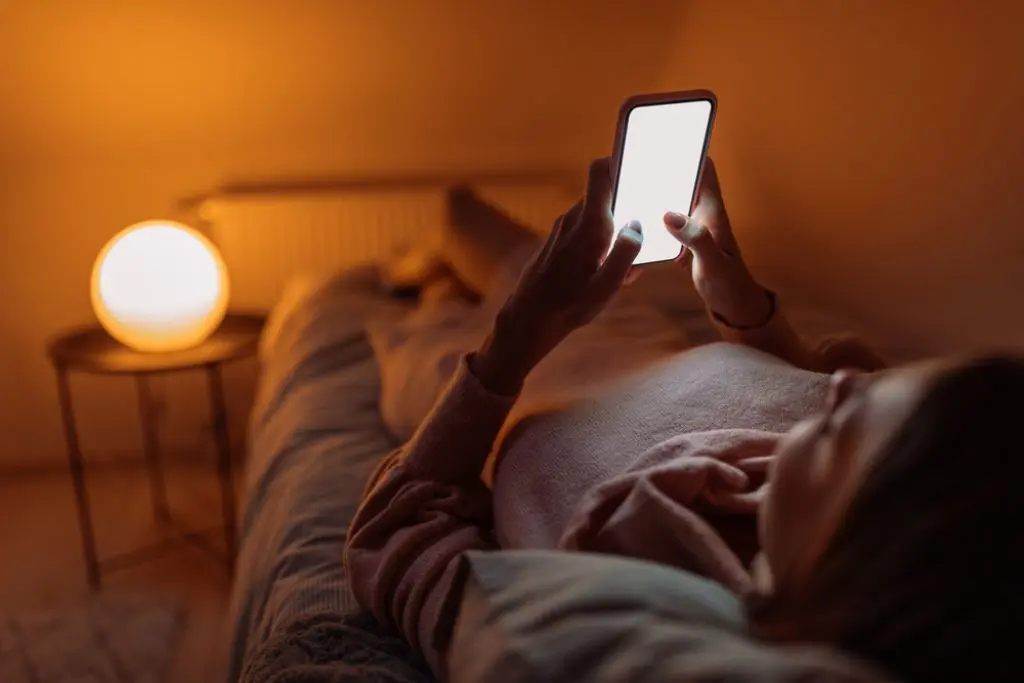Could Your Health Be Suffering Because Of Revenge Bedtime Procrastination?

December 2, 2022 - Updated December 2, 2022

We’ve all been there - those nights when you know you should go to sleep and will regret staying up late when your alarm jolts you awake the next morning, but you just can’t help yourself. You click play on another episode of your favourite show or scroll for a few (ok more than a few) more minutes on your phone and try to convince yourself a few hours of sleep will be plenty.
This common modern-age phenomenon has been termed ‘revenge bedtime procrastination’, derived from the Chinese phrase ‘bàofùxìng áoyè,’ meaning ‘retaliatory staying up late’. When a tweet from journalist Daphne K Lee went viral, it became clear just how many people relate to the experience.
Daphne described revenge bedtime procrastination as when people who don’t have much control over their daytime life refuse to sleep early in order to regain some sense of freedom during late-night hours, while another 2014 study defined it as failing to go to bed at the intended time, even though there are no external circumstances preventing you from doing so.
Some days you might be procrastinating getting into bed, and other days you might be lying in bed putting off going to sleep. Sound familiar? Yep, we’ve been there too.
In fact, a survey from the American Academy of Sleep Medicine showed a massive 88% of American adults admitted they had lost sleep due to staying up late to watch multiple episodes of a TV show. As if that figure didn’t sound high enough, it jumps to 95% when looking at people aged 18-44. And people aren’t just staying up late to watch shows, either! Those surveyed have also delayed going to sleep to read, play video games and watch sports.
So why do we do it? How does it affect our health? And how do we break the cycle? It’s time to fight back against your sleep procrastination. You’ll be better for it!

Why do we experience sleep procrastination?
Bedtime procrastination usually isn’t about avoiding sleep, but wanting to have more leisure time to do the things you enjoy.
The Sleep Foundation says the decision to sacrifice sleep for leisure time tends to be driven by a daily schedule lacking in free time and involves three factors:
A delay in going to sleep that reduces your total sleeping hours
Not having a valid reason for staying up late, such as a social event or being unwell
Being aware that delaying your bedtime could lead to negative consequences
Another study from 2021 investigated the relationship between boredom and sleep quality and found proneness to boredom was associated with increased bedtime procrastination and poorer sleep quality. Despite feeling tired, people who are bored tend to try and find something interesting to do instead of going to bed.
Do you feel as though the later it gets, the less you can manage your behaviour and emotions and the more prone you are to distraction? One 2014 study found people who scored lower on self-regulation measures reported higher levels of bedtime procrastination and being more responsive to distractions.
The Sleep Foundation emphasises sleep procrastination appears to be tied to significant daytime stress, which has been supported by 2018 research that suggests people may be less likely to stick to their intended bedtime after a taxing day.
Whether you’re juggling the demands of children, family or study, a job involving high stress or long hours, or an overwhelming combination of things, taking back time at the end of the day for entertainment or relaxation might be your only chance to unwind.
Having me-time is so important for your wellbeing, especially if your daily life is stressful, but it can become an issue if the only time available is eating into your precious sleeping hours.

How does sleep procrastination affect your health?
A lack of sleep can take a much bigger toll than just giving you dark circles under your eyes the next day.
The 2019 Phillips Global Sleep Survey revealed over two-thirds of adults worldwide feel they don’t get enough sleep, and The Sleep Foundation says sleep deprivation can have significant negative effects on your mental, physical and emotional health - both short and long-term.
It affects your thinking, decision-making, immunity, memory and ability to regulate your emotions, as well as increasing your risk of cardiovascular problems and metabolic disorders like type 2 diabetes.
Research from 2018 has also highlighted how important sleep is for your physical and mental health and good quality of life. A lack of quality sleep is a pervasive worldwide problem and alongside increased incidences of cardiovascular disease, depression, obesity and diabetes, it can also lead to accidents while driving or at work.
More leisure time? Heck yes! But risking all of that? Hard pass.
How do you break the cycle of sleep procrastination?
If you’re a bedtime procrastinator and want to rewire your habits, a helpful place to start can be to become more aware of why you’re staying up late. One 2018 study published in Behavioural Sleep Medicine journal identified three themes in relation to sleep procrastination:
Deliberate procrastination, where participants reported delaying their bedtime because they felt they deserved more time for themselves.
Mindless procrastination, where participants lost track of time due to being immersed in their evening activities.
Strategic delay, where participants went to bed late in order to fall asleep faster.

To understand your own habits and motivations better, here are a few questions to ask yourself:
If I’m deliberately sacrificing sleep for relaxation, fun and me-time, could I find small pockets of time during the day for things I enjoy or find relaxing?
If I’m sacrificing sleep because I’m immersed in what I’m doing and lose track of time, would it help to set an alarm to start my bedtime routine?
What can I do to make my daily life less stressful or have more free time? Could I set new boundaries at work or home, delegate tasks to other people, look for a new job, ask for help, or simply stop doing certain things?
What cues do I override that I could start listening to, such as yawning, boredom and heavy eyes?
How would I benefit by going to bed on time and getting more sleep?
Beyond that, the best remedy to avoid sleep deprivation is developing good sleep habits. Try to stick to a consistent bedtime and wake-up time each day, move your body each day, avoid alcohol and caffeine in the evenings, and put away your electronic devices at least 30 minutes before bed.
If you’re a sucker for staying up late watching TV, the American Academy of Sleep Medicine recommends setting a time or episode limit each night before you start watching, avoiding watching shows in your bed or bedroom before sleep, turning off autoplay, and having a break between each episode.
Struggling to adjust and create new bedtime habits? Have a think about what you could do to make your routine something you look forward to, such as lighting a candle, reading, playing calming music, journalling or meditating.
As tempting and fun as revenge bedtime procrastination can be, it can quickly start to take its toll on your energy, health and wellbeing. Without enough energy, we all know how quickly our relationships, work, and fitness routine begin to suffer, too!
Making sleep a priority isn’t always easy or achievable, and it’s so important to have downtime for yourself, but getting the rest you need to feel your best is always going to be worthwhile.

A more empowered you starts with Sweat, and our editorial team is here to bring you the latest fitness tips, trainer recommendations, wellbeing news, nutritional advice, nourishing recipes and free workouts.
* Disclaimer: This blog post is not intended to replace the advice of a medical professional. The above information should not be used to diagnose, treat, or prevent any disease or medical condition. Please consult your doctor before making any changes to your diet, sleep methods, daily activity, or fitness routine. Sweat assumes no responsibility for any personal injury or damage sustained by any recommendations, opinions, or advice given in this article.
Wellbeing